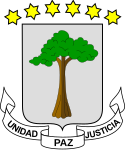2011 Equatorial Guinean constitutional referendum
 |
|---|
A constitutional referendum was held in Equatorial Guinea on 13 November 2011. It allowed the incumbent President Teodoro Obiang Nguema Mbasogo (ruling since 1979) to run for at least two more seven-year terms as well as establish the post of Vice-President, widely expected to be given to his son Teodoro Nguema Obiang Mangue in preparation of dynastic succession.[1]
Background
The constitutional changes included imposing term limits on the presidency, allowing two seven-year terms. They also abolished age restrictions, allowing the then 69-year old President Obiang to run when he turned 75.[2] The changes were hailed by the government as a democratic advance, with the addition of term limits highlighted by state media.[3] They would also allow the president to create the post of Vice President, suspected to be given to Obiang's son, Teodoro Obiang Nguema Mbasogo,[2] then under investigation in the United States and France for money laundering.[4]
Conduct
Many denounced the referendum as fake, with many widespread cases of voter fraud and intimidation of groups trying to monitor the votes. They also pointed to the fact that votes were counted by those close to the government.[2] Opposition leader Plácido Micó Abogo claimed that the proposal was not even seen the official text of the constitutional changes. He removed poll watchers after threats of violence, including one of a young supporter who alleged he "was threatened with being tortured by a colonel."[5] Despite these reports, the government claimed the vote had passed peacefully.[6] There was also concern that the provision on term limits would not apply retrospectively, allowing Obiang to run again in 2016,[7] which he did.
Results
| Choice | Votes | % |
|---|---|---|
| 295,780 | 97.73 | |
| No | 6,858 | 2.27 |
| Valid votes | 302,638 | 99.31 |
| Invalid or blank votes | 2,092 | 0.69 |
| Total votes | 304,730 | 100.00 |
| Registered voters/turnout | 331,982 | 91.8 |
| Source: African Elections Database | ||
References
- ^ Equatorial Guinea arrests key opposition member Archived 2016-03-05 at the Wayback Machine Yahoo News, 4 November 2011
- ^ a b c "Equatorial Guinea: Vote Discredited by Irregularities". hrw.org. Human Rights Watch. Archived from the original on 24 November 2016. Retrieved 24 November 2016.
- ^ "Rights groups say E.Guinea referendum is power grab". Reuters Aftrica. Retrieved 24 November 2016.
- ^ Zeveloff, Julie. "Meet The Playboy Son Of An African Dictator, Who Just Got In Trouble With The Justice Department". businessinsider.com. Business Insider. Retrieved 24 November 2016.
- ^ "Equatorial Guinea holds constitutional polls". Al Jazeera. Retrieved 24 November 2016.
- ^ "Equatorial Guinea presidents' terms are numbered". Mail and Guardian. Archived from the original on 25 November 2016. Retrieved 24 November 2016.
- ^ "Slippery constitutional changes in Equatorial Guinea". Public Radio International. Archived from the original on 25 November 2016. Retrieved 24 November 2016.
